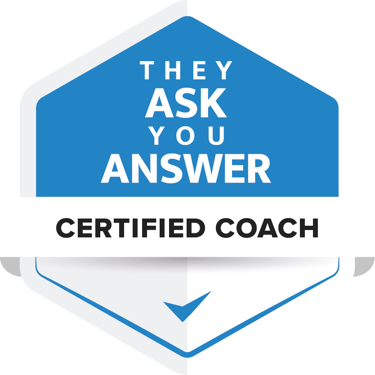What are the benefits of They Ask, You Answer for sales?

This is the problem with They Ask, You Answer:
When online marketers or business leaders hear Daan speak about his approach to online marketing in the modern era, or when they have read the book, they almost always get excited.
They see the big picture.
They understand how creating content that honestly and thoroughly answers their ideal buyers' most pressing questions, concerns and fears will help them dominate their industry.
But with sales professionals, it's a completely different story.
And frankly, they can't be blamed for not seeing the potential of 'They Ask, You Answer' at first either.
Sales teams have too often burned themselves on marketing
One of the popular phrases used by industry professionals is "sales and marketing alignment," which is a polite way of saying that these two departments should work well together. Unfortunately, this is usually not the case.
What a lack of "sales and marketing alignment" actually means is that sales teams don't trust marketing to create anything of value for them. Instead, they see marketers producing woolly content that may increase brand awareness but does little to close deals.
Marketing, on the other hand, sees sales as revenue-obsessed beings who come from another planet and who consider closing deals more important than customer loyalty and long-term brand success.
With thousands of companies around the world experiencing such a gap, it is no wonder marketers feel misunderstood and sales teams don't trust anything that smacks of marketing.
For many sales professionals, blogs, posts on social media and YouTube videos seem to do nothing to generate revenue. Instead, they sound more like expensive expenses in a marketing budget.
Often those sales teams are not even wrong about that.
So Sales has every right to be skeptical when marketing comes up with yet another new book or vision.
But this time is different.
They Ask, You Answer is a sales philosophy, not a marketing philosophy
Although many of the core principles of They Ask, You Answer sound like marketing (content creation, blogging, YouTube, social media, knowledge center), this approach is primarily focused on sales.
The basic principles of They Ask, You Answer are simple: address customers' questions and concerns so that they buy from you more easily.
Yes, some of what you produce will create search traffic and impressions on social media, but the one who benefits the most from They Ask, You Answer, is ultimately the prospect who enters the sales process faster and goes through that process faster.
When They Ask, You Answer is properly implemented, every blog article, video and website page is created through the lens of what the sales team needs - based on their front-line knowledge of what their ideal buyers are thinking and need.
When this happens, marketing materials are suddenly relevant and useful to the sales team.
Sales can share content with prospects and be confident that organic leads have not read something on the website that is inconsistent with the sales process.
But the marketing team cannot do this without the help of the sales team. Marketing does not speak directly to buyers the way sales does.
When teams work together, they can produce content that actually helps sales.
Let's see exactly how that works.
The 7 Most Important Benefits of They Ask, You Answer
To succeed with They Ask, You Answer the sales team and the marketing team must work together. They meet, hold brainstorming sessions, and sales controls the content that marketing produces (sometimes this is done in what we call a revenue team).
I promise you that this is a minimal time investment and is well worth everyone's time.
1. It forces your entire business to understand your buyers better than ever before
At the heart of They Ask, You Answer is an absolute obsession with what your buyers think, feel and look for.
Understanding your buyers is an issue that must involve the entire company.
Marketers must collaborate with sales, customer service professionals and other experts within the company to get to know the customer before, during and after the purchase.
They must dive into data and analysis and interview past customers.
If you understand your customers, you can produce content that addresses their needs, concerns and problems.
The result is customer-focused content that generates revenue, not useless statistics.
2. Content production reinforces your sales message
Sales professionals have heard most of the questions a prospect could ever ask, and they have answered them all. They have seen which answers have satisfied customers and which have not.
When sales teams are involved in producing content, they hone the way they answer tough questions and improve the way they communicate with customers in the future.
3. 'Assignment selling' shortens the sales cycleu
You probably know that your prospect is going to ask a specific question at a specific time. Almost everyone asks the exact same question at that moment, right?
Instead of spending your precious time answering the question during the sales call, send the prospect a video or article that thoroughly answers this question - even before the prospect has asked it.
Now your conversation is more productive and you gain the buyer's trust during the process.
This process is called "assignment selling' and it is a tried, proven way to use educational content in the sales process.
4. You know more about your buyers before they enter the sales funnel
With advanced sales, marketing automation and analytics platforms like HubSpot, sales teams can see every website page, article and video a prospect viewed before contacting a sales representative.
This information is invaluable for understanding exactly what your prospects are interested in and how much they know about you and what you sell - all before a single sales call has even taken place.
So you have an incredible amount of information about your prospects at your fingertips.
5. Prospects already trust your brand when they enter your sales funnel
When customers educate themselves on your website or YouTube channel before speaking with sales, they enter the sales process with an established relationship with your company.
They already know you. They trust you.
And buyers are more likely to buy from companies they trust.
Sales professionals can spend more time during meetings having in-depth conversations specifically focused on the needs of the people they are speaking with.
This allows them to do what they do best: sell.
6. Your knowledge center helps you train future employees
The more content you create, the more articles, videos and more you will have at your disposal for current and future employees to use as training materials.
It will help your employees become familiar with the company doctrines, philosophies and so on in a more effective and efficient manner.
7. Good content means more trust, more trust means shorter sales cycles, shorter sales cycles mean happier sales teams
By empowering your buyers to educate themselves through the content you create and publish, you give your sales teams the gift of time.
More time to spend on qualified leads, more time at the end of the day to clock out on time.
What should we do now to get started?
It's a big job to get all the noses in your company to move in the same direction where They Ask, You Answer is concerned.
That's because, unlike strategies in the past, They Ask, You Answer must be embraced by all teams - leadership, sales, marketing, service, and so on. It is not the domain of one team or one individual. It is a cultural shift within your company, and that takes time.
Related articles
November 7, 2024
-
Reading time: +/- 8 min
December 3, 2024
-
Reading time: +/- 8 min








